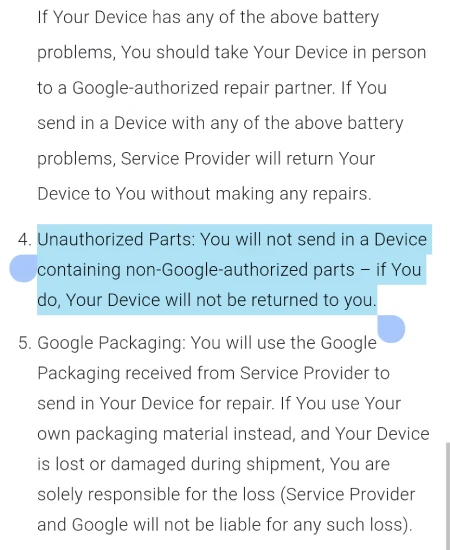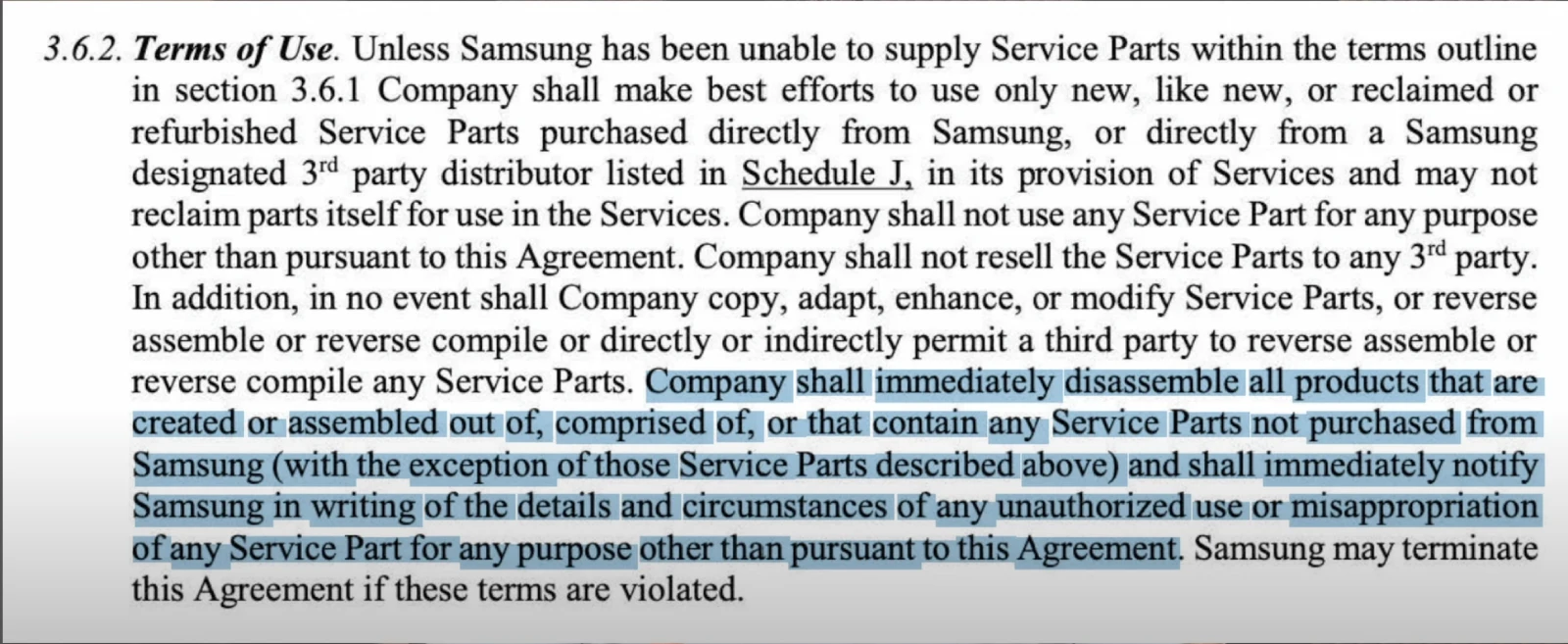Update 07/06/24 pm (IST): Android Authority reports that a Google spokesperson reached out to them and provided the following statement:
If a customer sends their Pixel to Google for repair, we would not keep it regardless of whether it has non-OEM parts or not. In certain situations, we won’t be able to complete a repair if there are safety concerns. In that case, we will either send it back to the customer or work with them to determine next steps. Customers are also free to seek the repair options that work best for them. We are updating our Terms and Conditions to clarify this.
This means you shouldn’t have to worry about Google keeping your phone if the service center spots an aftermarket part.
Original article published on June 4, 2024, follows:
If you own a Google Pixel or Samsung Galaxy phone, you may want to think twice before sending it in for repair through the manufacturer’s repair programs. Recent revelations have shown that both Google and Samsung have anti-consumer policies that could result in your repaired device being kept if it contains any non-OEM (original equipment manufacturer) parts.
Google’s troubling repair policy
The controversy around Google’s policies emerged tech repair YouTuber, Louis Rossmann, highlighted a concerning policy in Google’s “Service & Repair Program Terms & Conditions“ documentation.
The relevant excerpt states: “You will not send in a Device containing non-Google-authorized parts – if You do, Your Device will not be returned to you.” Check the screenshot below for reference:

This policy came into effect on July 2023. If Google’s repair technicians discover that a Pixel phone sent in for repair contains any non-OEM parts, the company reserves the right to simply keep the device rather than return it to the customer after service.
It has understandably sparked outrage among consumers and right-to-repair advocates. Imagine sending in the phone you rely on daily, only to have Google confiscate it permanently, just because you had previously installed a third-party replacement battery or screen to reduce repair costs. You can watch Louis Rossmann’s rant on the subject for more details:
Samsung’s restrictive repair contracts
Google isn’t alone in placing undue restrictions on device repairs. Just a few weeks ago, Samsung was caught implementing oppressive terms in its contracts with independent repair shops regarding the use of aftermarket Samsung parts.
A leaked Samsung contract showed the company requires repair shops to provide Samsung with excessive customer data like names, contact information, and device identifiers just to obtain repair parts. Even more shockingly, the contract mandates that repair shops must “immediately disassemble” any devices brought in that contain non-Samsung parts and “immediately notify” Samsung if a customer has used third-party components.

Not only does this obliterate any semblance of privacy between customers and repair shops, but it also forces shops to effectively destroy customers’ working devices just for containing aftermarket parts. Repair experts blasted the contracts as a blatant violation of consumer rights and ownership principles.
The environmental impact
Beyond infringing on consumer rights, the anti-repair policies have significant environmental consequences as well. When manufacturers place roadblocks in the way of easy, affordable repairs, it contributes to the massive stream of e-waste flowing into landfills and incinerators as consumers discard devices that could have remained in use with proper repairs.
The YouTube channel LinusTechTips has a great video on the subject that outlines everything you need to know. I’ve added it below in case you’re interested in learning more about what exactly “right to repair” means:
The right-to-repair movement highlights how heavy-handed manufacturer repair restrictions contradict stated environmental goals and commitments. If companies truly want to reduce their carbon footprints and extend the usable lifespans of devices, repair policies need to be more open and consumer-friendly. Matter of fact, Google recently claimed it wanted to make the repair process for Pixel phones easier than ever in a podcast. Yet, its official terms and conditions clearly indicate that Google wants to make sure that it’s the only company that benefits from the repairs.
Similarly, Samsung also highlights its “environmentally conscious activities,” yet its policies suggest it’s ready to create more e-waste if consumers decide to opt for third-party parts.
The good news – right to repair laws
Fortunately for consumers, the tide may be turning in favor of reform. A growing number of states have passed “right to repair” laws that aim to rein in the most egregious anti-consumer behaviors from manufacturers.
New York, for example, recently implemented a law prohibiting manufacturers from requiring repair shops to use OEM parts or tools. The law also mandates that OEMs must provide repair shops and owners with access to manuals, tools, firmware updates and parts needed to service electronic devices like phones and appliances.
Similar right-to-repair laws are now on the books in Minnesota, Colorado, and several other states with more likely on the way. At the federal level, the Biden administration has voiced support for greater repair access and the FTC is considering new rules around the issue as well.
While these laws don’t eliminate all obstacles, they go a long way toward leveling the repair playing field in favor of consumers. Companies like Google and Samsung can no longer bully independent repair shops or hold customers’ devices hostage through restrictive contracts or policies.
How to protect yourself
In the meantime, until right-to-repair reforms become more widespread, owners of Google and Samsung devices may want to take some precautions:
- Avoid sending any phones containing non-OEM parts to the manufacturer for repair if possible. Try to find a reputable local shop instead.
- If you must use the manufacturer’s repair service, be upfront that your device has aftermarket parts installed. Don’t let them claim ignorance.
- Before any repair, backup your data and remove the SIM card/SD card in case the device is confiscated.
- Research your state and local laws around repair rights before agreeing to any manufacturer repair contracts or policies.
- Support and advocate for right-to-repair reforms in your area to prevent anti-consumer practices.
The repair policies from Google and Samsung are just the latest examples of how major tech manufacturers continue to prioritize profits and control over consumer rights and environmental responsibility. While the fight for repair freedoms is far from over, new legislation represents a pivotal step in the right direction for ownership rights and sustainability.
Featured image source: iFixit
TechIssuesToday primarily focuses on publishing 'breaking' or 'exclusive' tech news. This means, we are usually the first news website on the whole Internet to highlight the topics we cover daily. So far, our stories have been picked up by many mainstream technology publications like The Verge, Macrumors, Forbes, etc. To know more, head here.

